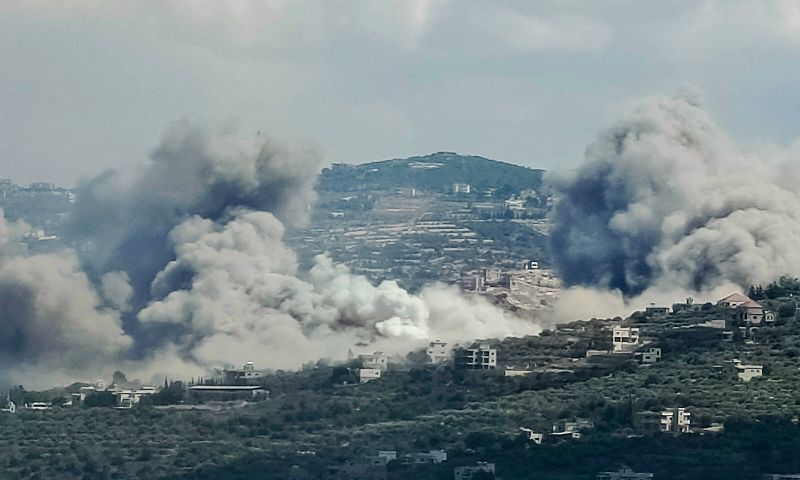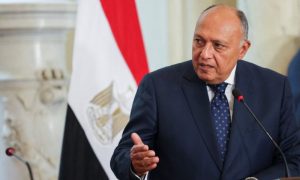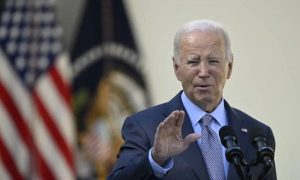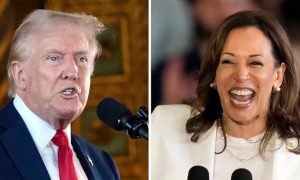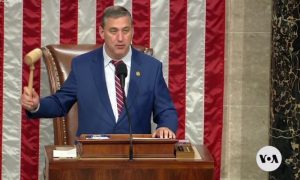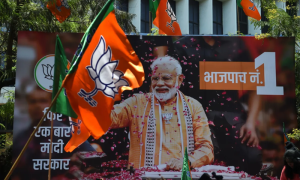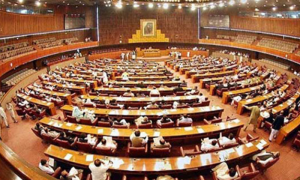BEIRUT: Lebanon’s Health Minister Firass Abiad said the death toll in Israeli strikes in southern Lebanon on Monday rose to 356, including 24 children and 42 women, while thousands of families fled the relentless Israeli bombardment.
During a news conference, the Health Minister said that the toll was “356 dead including 24 children and 42 women — that’s who we know about until now.” He said that “thousands of families from the targeted areas have been displaced”.
Abiad said that more than 5,000 people had been injured “in less than a week” of Israeli attacks after Hezbollah pagers and walkie-talkies exploded and an Israeli strike on Beirut’s southern suburbs.
The war began when the Palestinian resistance group Hamas carried out the attack on Israel on October 7, which prompted Hezbollah and other groups around the region drawn into the conflict.
On Monday, Israeli forces reported targeting over 1100 Hezbollah sites in southern Lebanon, while Hezbollah claimed responsibility for strikes on northern Israel.
“Israeli enemy strikes on southern towns and villages since this morning” have killed “356 people and wounded 727 others”, the health ministry said, with children, women and health workers among the casualties.
World powers have implored Israel and Hezbollah to pull back from the brink of all-out war, with the focus of violence shifting sharply in recent days from Israel’s southern border with Gaza to its northern border with Lebanon.
Abiad expressed deep concern over the humanitarian crisis unfolding in Lebanon, stating, “We sleep and wake up to bombardment… that’s what our life has become.” As the violence spreads, many Lebanese citizens are struggling to find safety, with reports indicating that hundreds are seeking shelter in schools and makeshift camps.
Israeli military spokesman Rear Admiral Daniel Hagari warned that strikes would continue and ordered civilians in Lebanon to avoid areas linked to Hezbollah. “We are engaging in extensive and precise strikes against targets throughout Lebanon,” he said, signaling to intensify military operations.
In southern towns and villages, the devastation has been profound. The Israeli military has urged residents in the Bekaa Valley to evacuate as operations broaden. Eyewitness accounts describe scenes of chaos, with explosions lighting up the skies and plumes of smoke rising over historic areas like Baalbek.
The Lebanese Ministry of Education announced the closure of schools in several regions for at least two days. The humanitarian situation is dire, with thousands displaced and many more in urgent need of assistance.
The strikes sent hundreds of people fleeing their homes, according to Bilal Kachmar, an official in Tyre. “Hundreds of displaced people rushed” to a school-turned-shelter in the southern city, he said, with many others “camping out in the streets”.
Explosions around the ancient city of Baalbek in eastern Lebanon triggered flashes of fire and sent smoke billowing into the sky.
The attack came after an Israeli air strike in Hezbollah’s southern Beirut stronghold on Friday killed its elite Radwan Force commander, Ibrahim Aqil, along with other commanders and civilians.
Last Tuesday and Wednesday, coordinated communications device explosions that Hezbollah blamed on Israel killed 39 people and wounded almost 3,000.
On Sunday, Hezbollah said it targeted Israeli military production facilities and an air base in the Haifa area with rockets as “an initial response”. On Monday the group said it had again fired rockets at military sites near Haifa.
Lebanese Prime Minister Najib Mikati condemned the Israeli strikes as a “plan that aims to destroy Lebanese villages and towns,” calling on the United Nations and world powers for intervention.
Meanwhile, US President Joe Biden emphasized his administration’s efforts to prevent the conflict from escalating into a broader war, while UN chief Antonio Guterres cautioned that Lebanon could become “another Gaza.”
Ahead of the annual General Assembly in New York, UN chief Antonio Guterres warned of Lebanon becoming “another Gaza” and said it was “clear that both sides are not interested in a ceasefire” there.
As the situation develops, fears are growing of a protracted conflict that could further destabilize the region. Hezbollah’s deputy chief, Naim Qassem, said the group is ready for all military options, suggesting that the conflict is entering a new and more dangerous phase.
The ongoing exchanges between Israel and Hezbollah have already displaced tens of thousands on both sides of the border, with civilians bearing the brunt of the violence.
Since October 7, Israel has launched a relentless bombardment campaign in Gaza killing at least 41,455 Palestinians, mostly women and children, according to figures provided by the territory’s health ministry. The UN has described the figures as reliable.









